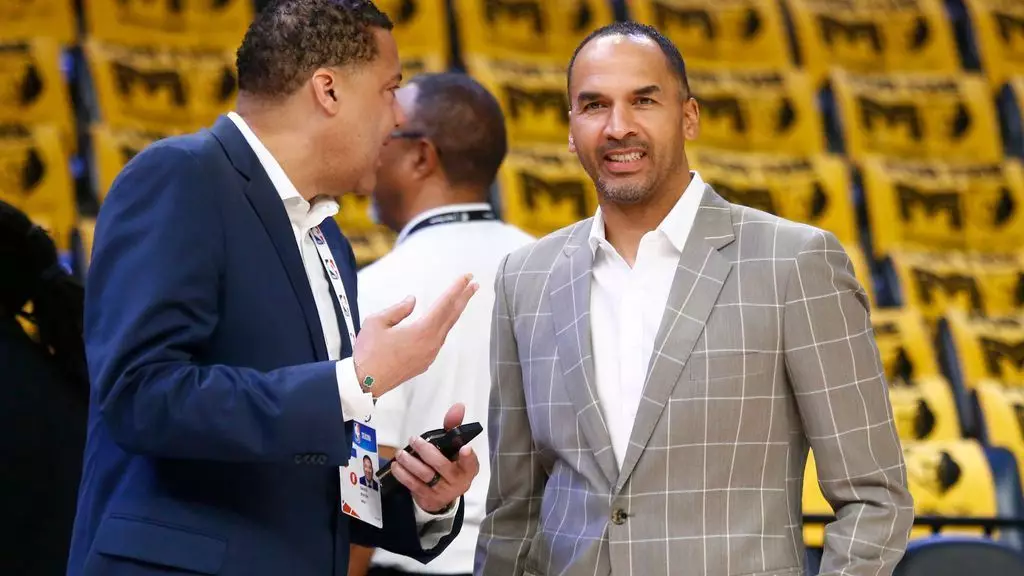In the ever-evolving drama of professional sports, few moments spark as intense scrutiny and debate as significant trades. The recent swap involving Dallas Mavericks’ rising star, Luka Doncic, and veteran powerhouse, Anthony Davis, has captured the attention of fans and analysts alike. Mavericks general manager Nico Harrison’s admission of underestimating the fandom’s affection for Doncic suggests a critical miscalculation in the club’s strategy. While he stands by the trade’s potential to create a championship-caliber team, one must question whether the emotional and market ramifications were worth the gamble.
Harrison’s comments during a recent press conference reveal both regrettable hubris and an unyielding belief in the team’s potential. He recognized the analytical risks inherent in trading a homegrown talent like Doncic, who has undeniably become a lynchpin for the Mavericks’ identity. Harrison likened the situation to a chess match, where strategic decisions must contend with the unpredictable emotional responses of fans. In this case, it appears he misjudged the fervor that Doncic inspires in the Mavericks’ loyal base. The uproar following the trade indicates a substantial disconnect between management and the fans, illuminating a potential gap in their overall decision-making process.
The Fallout: Injury and Missed Opportunities
Compounding the tension created by the trade was the unfortunate string of injuries plaguing both Davis and Kyrie Irving. Expectations of an immediate synergy between Davis, Irving, and the supporting cast quickly fell flat when injuries thwarted the opportunity for optimal lineup formations. After all, the complex nature of team dynamics often hinges not just on talent, but also on consistency and chemistry, both of which were significantly absent this season. Dallas faced potential catastrophe, coming perilously close to fielding teams crippled by the absence of eligible players.
Even with Davis back in the lineup, the Mavericks had a tumultuous run to the playoffs. The team’s ability to qualify for the play-in tournament—such a precarious achievement—provides a glimpse into both the talent and the chaos this season has wrought. While Harrison insists the team still possesses championship potential, one is left to ponder: how much of this season can be attributed to poor decision-making versus the fickle nature of injuries? If Davis and Irving had been healthy, would the narrative have shifted toward a more positive direction, easing the intensity of fan backlash?
A Draft to Rebuild Trust?
As the offseason unfolds, the pressure mounts on the Mavericks to develop a clear plan for revitalization. Selecting 11th in the upcoming draft presents an opportunity for Dallas to reclaim a semblance of credibility and strengthen its roster. The acquisition of a promising young talent could provide the fresh energy needed to excite the fan base—and repair some of the damage done by the recent trade.
However, there is a fine line between optimistic drafting and reckless desperation. Harrison has hinted at a willingness to explore free agency as well, which raises intriguing possibilities for potential acquisitions. Yet, the path forward must be navigated with a keen understanding of the dynamics at play—not just within the team, but also among the fanbase reeling from the recent upheaval. Maintaining open communication and transparency with those who support the team may be as critical to their success as any player they might secure in an upcoming draft or trade.
Rebuilding Trust in a Frenzied Landscape
Throughout this tumultuous process, one undeniable truth surfaces: trust between management and fans often proves fundamental to an organization’s long-term viability. Harrison’s struggle to connect with the sentiments of Mavericks fans underscores a broader theme that persists in professional sports. After all, teams are made up of more than just players; they are an emotional tapestry woven from the voices, hopes, and dreams of their supporters.
In the upcoming months, it is paramount that management takes steps not merely to strategize for championships but also to foster an environment where fan loyalty and investment are nurtured. The relationship between a franchise and its fans is a two-way street. As visible frustration mounts, how the Mavericks address concerns and re-establish connections with their supporters will determine the genuine trajectory of the franchise moving forward.
With every toss of the dice in the volatile arena of the NBA, it becomes increasingly clear that the path toward a championship is not just about the talent on the court; it is equally about understanding and valuing the voices that cheer from the stands.


Leave a Reply